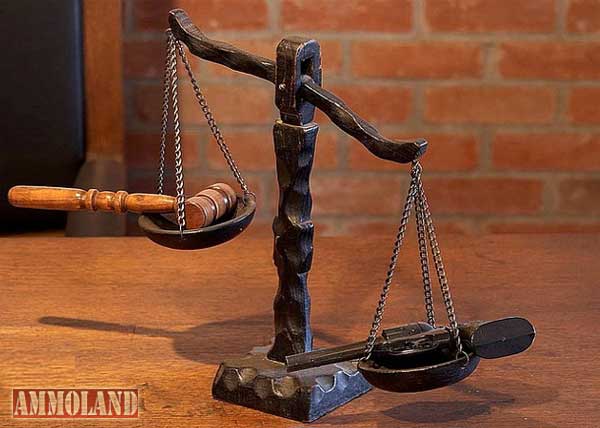And Undercuts The U.S. Constitution.


New York, NY -(Ammoland.com)- State governments and local governments that enact or establish antigun laws, ordinances, rules, and regulations must comply with the U.S. Supreme Court’s rulings in District of Columbia vs. Heller, 554 U.S. 570 (2008) and McDonald vs. Chicago, 561 U.S. 742 (2010).
They are not allowed to take the rulings of the U.S. Supreme Court lightly; and they are certainly not permitted to ignore the rulings of the high Court in the Heller and McDonald cases out-of-hand.
It may therefore come as a shock to some people and an unpleasant surprise to many that State and local governments often do just that.
Antigun proponents zealots do not, of course, see a problem with this. Indeed, Michael Bloomberg’s antigun group, “Everytown for Gun Safety,” for one — the antigun political group that Bloomberg created upon leaving office as Mayor of New York City, after serving as its Mayor for twelve years — is ecstatic over an April, 2015 decision of the Seventh Circuit Court of Appeals in Friedman vs. City of Highland Park, Illinois, 784 F.3d 406 (7th Cir. 2015). Just read the report by the left-wing news commentary site, “AlterNet,” on this. The article, which was posted on December 12, 2015, is titled, “Aggressive Pushback at Evil NRA Is Working; Lives Will Be Saved as a Result.”
Regardless of a person’s personal feelings toward guns generally, and gun ownership and gun possession in particular, courts that allow unconstitutional laws and ordinances of government to stand are to be singled out for condemnation, for the very preservation of our Constitution is at stake. Case in point: the aforesaid Friedman case, decided in April of 2015.
In Friedman the Plaintiff Appellants, Ari Friedman and Illinois State Rifle Association, brought suit against Defendant Appellee, City of Highland Park, in the State of Illinois. Highland Park had passed an ordinance, prohibiting the possession of so-called “assault weapons” and “large capacity magazines,” namely ammunition magazines that can accept more than ten rounds.
Plaintiff Appellant Friedman lawfully owned a banned rifle and several large capacity magazines, before the ban took effect. The prohibited firearm and magazines are not “grandfathered in” by the ordinance. In that respect, the Highland Park ordinance goes well beyond the highly restrictive and oppressive New York Safe Act, insofar as those residents of New York who lawfully owned and possessed firearms, defined as ‘assault weapons’ prior to the effective date of the NY Safe Act, on January 15, 2013, are permitted to retain their weapons so long as they are timely registered in accordance with New York law. In Illinois, though, under the unconscionable City of Highland Park ordinance, Friedman was forced to surrender his banned weapon and banned ammunition magazines to the government.
To have any chance of regaining possession of his weapons Friedman had no recourse but to file an action in the U.S. District Court for the Northern District of Illinois, challenging the oppressive ordinance and hoping that the federal court would strike down the restrictive gun ordinance as an unconstitutional infringement on the exercise of a fundamental right. But, the District Court denied the challenge, upholding the Highland Park ordinance. Friedman then appealed the adverse decision to the Seventh Circuit Court of Appeals.
The Seventh Circuit citing Heller, at the outset of its Opinion, acknowledged that “Heller holds that a law banning the possession of handguns in the home (or making their use in the home infeasible) violates the individual right to keep and bear arms secured by the Second Amendment.” The Seventh Circuit also pointed to the holding of the high Court in the subsequent McDonald case, decided in 2010, where the U.S. Supreme Court held that, “the Second Amendment creates individual rights that can be asserted against state and local governments.”
Given the clear, cogent, unambiguous import of the holdings in Heller and McDonald, the Seventh Circuit Court of Appeals should have reversed the adverse decision of the District Court. Instead, the Seventh Circuit affirmed the decision of the lower Court. In permitting an unconstitutional local ordinance to stand, rather than striking it down, the Seventh Circuit Court of Appeals relied not on actual holdings of the U.S. Supreme Court in Heller and McDonald, but on dicta in those cases, arguing that, because the high Court did not – according to the Seventh Circuit’s faulty reasoning – define the scope of the Second Amendment in its entirety, the Seventh Circuit was free to read into Heller and McDonald essentially whatever it wanted to.
The Seventh Circuit surmised that, because the City of Highland Park did not prohibit all weapons, the City could prohibit some of them – including an entire category of weapons that had been perfectly legal to own and possess prior to adoption of the City ordinance.
The Seventh Circuit Court of Appeal’s decision is grounded on faulty legal reasoning. The Heller holding entails that bans on entire categories of weapons are impermissible absent a clear and compelling reason for government to do so and this means that a government is not permitted to ban entire categories of weapons unless the court of review satisfies itself that a particular governmental law, or ordinance is the least restrictive means available for advancing a compelling governmental interest. The Seventh Circuit failed to apply the appropriate legal standard of review to an ordinance negatively impacting a fundamental right, and that failure resulted, not surprisingly, in a bad decision.
Friedman and the Illinois State Rifle Association, then petitioned for a writ of certiorari to the U.S. Supreme Court. Last week a majority of Justices denied the writ. Justices Thomas and Scalia were so incensed at the refusal to grant the petition for writ that Justice Thomas, joined by Scalia, admonished their brethren in a written dissent. In his opening remarks, Justice Thomas wrote, “‘Our central holding in’ District of Columbia v. Heller was ‘that the Second Amendment protects a personal right to keep and bear arms for lawful purposes, most notably for self-defense within the home.’ And in McDonald, we recognized that the Second Amendment applies fully against the States as well as the Federal Government.
Despite these holdings, several Courts of Appeals—including the Court of Appeals for the Seventh Circuit in the decision below—have upheld categorical bans on firearms that millions of Americans commonly own for lawful purposes. Because noncompliance with our Second Amendment precedents warrants this Court’s attention as much as any of our precedents, I would grant certiorari in this case.”
The Seventh Circuit has capitulated to local government; ignored the directives of the U.S. Supreme Court; failed to apply the appropriate legal standard when testing the constitutionality of a law or ordinance, infringing a fundamental right; reduced a serious constitutional issue to a mere administrative one; saw fit to prostate itself before a mere local government; made itself, wittingly or not, into a subservient ally of antigun groups; and allowed its status as an independent trier of law and fact to play a subordinate role to political forces.
In ceding its own, critical judicial role, the Seventh Circuit Court of Appeals has demonstrated a callous disregard for its duties and joined with government in undermining the Second Amendment to the U.S. Constitution.
And, it is most unfortunate that the majority of the U.S. Supreme Court Justices paid no heed to the remonstrations of Justices Thomas and Scalia. In denying the Friedman’s petition for writ of certiorari, the majority of Justices allowed a clearly unsound and deeply offensive ruling of the Seventh Circuit to stand, unchallenged.
What has transpired in the Friedman case will only embolden antigun groups and their allies in government and in courts friendly to their political objectives to take further steps and ever more daring and outrageous steps to undercut the fundamental right of the people to keep and bear arms. Erosion of our remaining rights and liberties, as set forth in our Bill of Rights will, as well, almost certainly follow suit.
Read the long form of this article at Arbalestquarrel.com
About The Arbalest Quarrel:
Arbalest Group created `The Arbalest Quarrel’ website for a special purpose. That purpose is to educate the American public about recent Federal and State firearms control legislation. No other website, to our knowledge, provides as deep an analysis or as thorough an analysis. Arbalest Group offers this information free.
For more information, visit: www.arbalestquarrel.com.
